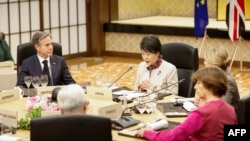U.S. Secretary of State Antony Blinken says this week’s Group of Seven foreign ministers' meetings are an important moment for member countries to speak with “one clear voice” in response to the Israel-Hamas war and the humanitarian crisis in Gaza.
Japan chairs this year’s G7 meetings on Tuesday and Wednesday in Tokyo, which come amid increasing calls for humanitarian pauses in the Gaza war.
On Tuesday, Blinken held bilateral talks with Japanese Prime Minister Fumio Kishida and Foreign Minster Yoko Kamikawa.
At the beginning of the meeting, Kamikawa said Japan “unequivocally condemns” the “terrorist attacks by Hamas and other Palestinian militants” on October 7 and hopes for the early release of hostages held by Hamas, which include U.S. citizens.
“We appreciate the diplomatic efforts of the U.S. in the recent situation in Israel and Palestine,” she said. “You have our utmost support.”
Through a translator, the Japanese foreign minister added “the solid unity between Japan and the U.S. is especially critical at this time” as the international community is facing other challenges in Ukraine and in East Asia.
Blinken told Kamikawa and other senior Japanese officials that “this is a very important moment as well for the G7 to come together in the face of this crisis and speak as we do in one clear voice.”
Japan has called for “all direct parties to act in accordance with international law” and to de-escalate the conflict, while advocating for the release of all hostages. Japan has also pledged funds to help mitigate the dire humanitarian needs in the Gaza Strip.
During a recent trip to the Middle East, Kamikawa called for a humanitarian pause in the Israeli assault on Hamas targets in the Gaza Strip.
French Foreign Minister Catherine Colonna has reiterated calls for an "immediate humanitarian truce" in Gaza, which she said must be able to lead to a cease-fire.
The United States supports humanitarian pauses in Gaza but rejects a complete cease-fire. U.S. officials have said such a move would allow Hamas militants to regroup and carry out future attacks.
In a phone call on Monday, U.S. President Joe Biden and Israeli Prime Minister Benjamin Netanyahu discussed “the possibility of tactical pauses” in the Israeli offensive to allow civilians to depart safely from target areas.
Netanyahu maintains there will be no cease-fire until the hostages taken by Hamas are returned.
While members of the G7 have increasingly stressed the need to minimize civilian casualties, they have largely avoided directly criticizing Israeli actions.
Supporting Ukraine’s economic recovery and energy needs, as well as regional security are also on the agenda in Blinken’s talks with Japanese Prime Minister Kishida and Foreign Minister Kamikawa.
At Ankara airport on Monday, after concluding a two-and-a-half-hour discussion with Turkish Foreign Minister Hakan Fidan, Blinken said, “Even as we intensely focus on the crisis in Gaza, we are equally engaged in the vital work in the Indo-Pacific and other parts of the world to advance American interests.”
Before heading to Asia, Blinken was in Israel, Jordan, the West Bank, Iraq and Turkey, where he reaffirmed Washington’s support for humanitarian pauses in Gaza to allow the delivery of lifesaving aid to civilians.






